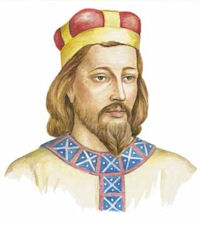37 MARKERS - 11 MATCHES to the of Vance or Wence.
According to Wikipedia:
Y-DNA testing results are normally stated as probabilities: For example, with the same surname a perfect 37/37 marker test match gives a 95% likelihood of the most recent common ancestor (MRCA) being within 8 generations,[22] while a 111 of 111 marker match gives the same 95% likelihood of the MRCA being within only 5 generations back.[13]
[22] references www.familytreedna.com This is the company that did my Y chromosome DNA test.
What does it mean to me? It's long shot, but there may be some relationship to German Royalty, or maybe a saint. Having the surname Vance/Wentz here are 4 males that match me within 1 of 37 markers, meaning 36/37 markers match; 2 matches within 2 of 37 markers or 35/37 markers match; 5 matches within 3 markers or 34/37 match. Those are the males with the surname Vance/Wentz that are very genetically close to me.
More here:
http://en.wikipedia.org/wiki/Good_King_Wenceslas
"Good King Wenceslas" is a Christmas carol that tells a story of a Bohemian king going on a journey and braving harsh winter weather to give alms to a poor peasant on the Feast of Stephen (December 26, the Second Day of Christmas). During the journey, his page is about to give up the struggle against the cold weather, but is enabled to continue by following the king's footprints, step for step, through the deep snow. The legend is based on the life of the historical Saint Wenceslaus I, Duke of Bohemia or Svatý Václav in Czech (907–935). The name Wenceslas is a Latinised version of the old Czech language "Venceslav".
"Good King Wenceslas" is a Christmas carol that tells a story of a Bohemian king going on a journey and braving harsh winter weather to give alms to a poor peasant on the Feast of Stephen (December 26, the Second Day of Christmas). During the journey, his page is about to give up the struggle against the cold weather, but is enabled to continue by following the king's footprints, step for step, through the deep snow. The legend is based on the life of the historical Saint Wenceslaus I, Duke of Bohemia or Svatý Václav in Czech (907–935). The name Wenceslas is a Latinised version of the old Czech language "Venceslav".
The Wentz/Wantz origin cut and pasted from http://vancehistoryonline.blogspot.com/p/short-history-of-vance-surname.html
Many of these families have traced their surname origins to original immigrants in the 18th or 19th century from Germany or Switzerland whose last name was Wentz or a variant like Wantz. In their new English-speaking home, the last name sounded like "Vance", and either through regular usage or by the pen of a government official the new spelling stuck.
Several books (see Online Books of Interest) describe the origin of the Wentz surname as a diminutive of "Wenceslaus" or the German variant "Wenzo", and track the name's association with a Saint Wendelin and of course several kings named Wenceslaus, with variants "Wenzelo" from 1198 through "Wenzel" in the 1300s. "Wentz" and "Wenz" were later variants appearing in the 1300s and 1400s near Basel in Switzerland and several locations in Germany. Other sources cite Slavic variants like Vaclav but agree on the same basic timeline.
The stories say an original Wentz family came out of Bohemia (part of the current Czech republic) or Pomerania (now part of Germany and Poland on the south Baltic Sea) and migrated into Bavaria in western Germany and to the city of Basel in Switzerland some 700 years ago. These stories have so far not been verified. In the 1700s and 1800s, however, several German and Swiss Wentz families immigrated to the US where the name became written as Vance.
